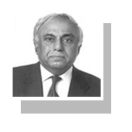Published in Dawn on June 16, 2023
GENDER bias appears to be baked into the very DNA of humankind, trapped in amber by cultural norms and historical misconceptions, including the false primacy attributed to muscular strength. The UN’s 2023 Gender Social Norms Index makes for depressing reading. According to the report, there has been no improvement since a decade in biases against women, with almost nine out of 10 men and women across the world still embracing such misogynistic notions. In the eyes of 50pc of people globally, men make better political leaders than women, and over 40pc consider men to be better business executives than women. Shockingly, 25pc of people believe it is acceptable for a man to beat his wife, behaviour that further reinforces women’s low status and leads to generational trauma. The global trend towards autocratic rule — even in ostensible democracies — and the consequent shrinking of personal freedoms, are in tandem with the erosion of women’s rights and gender equality. Women’s share in decision-making roles has remained woefully stagnant. As per the UN report, the share of women as heads of state or government has, on average, hovered around 10pc since 1995. And although women are more educated and skilled than ever before, gender bias continues to be a hurdle in the way of their economic empowerment. Consider that even in the 59 countries where women have more years of education under their belt than men, the average gender income gap is a whopping 39pc in favour of men.
In Pakistan’s patriarchal structure, gender bias is a lived reality, present within the home as well as outside. It holds females back from achieving their potential and reduces their existence to a woman’s ‘place’ in the home, an appendage rather than an individual with agency and autonomy. Despite a number of pro-women laws having been passed in recent years, it is still extremely challenging for most women to fight back against sexual harassment or domestic violence because mindsets have not shifted sufficiently. The public space is still perceived by many as a male domain with women as interlopers, fair game for sexual harassment — or worse. It is such notions that create a fertile ground for victim-blaming, which reinforces the power imbalance between the genders. Nevertheless, even though women in countries like Pakistan have a longer road ahead than most, traverse it we must.



